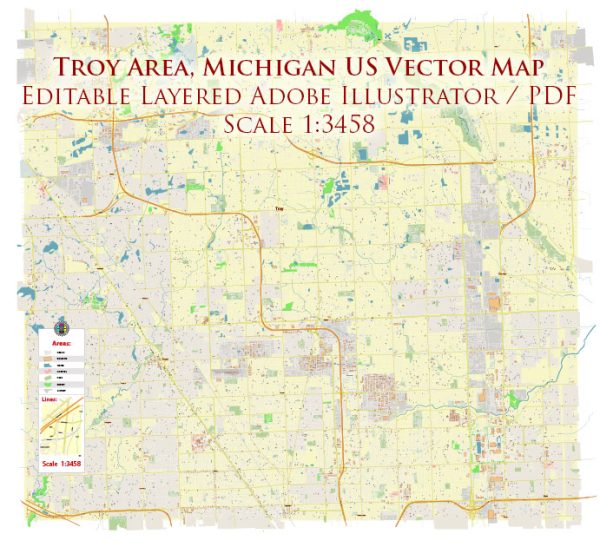Troy, a city located in Oakland County, Michigan, has a history of urban development that reflects its transformation from a rural community to a thriving suburban city. Here is an overview of the key phases in Troy’s urban evolution:
Early Settlement and Agriculture:
Troy’s history dates back to the early 19th century when the first settlers arrived in the area. The region was initially characterized by agricultural activities, with farms and orchards dotting the landscape.
Growth in the Post-War Era:
After World War II, Troy, like many other suburban areas across the United States, experienced significant growth and development. The GI Bill and the expansion of the automotive industry in nearby Detroit contributed to population growth as people sought homes in the suburbs. Troy’s proximity to Detroit made it an attractive location for those working in the burgeoning auto industry.
Residential Expansion:
In the 1950s and 1960s, Troy underwent a residential boom as suburbanization took hold. Housing developments and subdivisions replaced farmland, and the city’s population increased substantially. This era marked the shift from a primarily rural and agricultural community to a suburban residential area.
Economic Development:
As the Detroit metropolitan area continued to grow, Troy became a hub for business and commerce. The city attracted a diverse range of industries, including technology, finance, and manufacturing. The presence of major corporations and a business-friendly environment contributed to Troy’s economic development.
Commercial and Retail Growth:
Troy experienced significant commercial development, with the establishment of shopping centers and retail districts. The Somerset Collection, a high-end shopping mall, opened in the 1960s and has since undergone expansions, solidifying Troy’s status as a retail destination.
Educational and Cultural Institutions:
Troy’s commitment to education is evident in the establishment of quality schools and educational facilities. The city is also home to the Troy Historic Village, which preserves and showcases the community’s history, including several historic buildings.
Diversity and Community Services:
The demographic composition of Troy has become increasingly diverse over the years. The city has worked to provide a range of community services, including parks, recreational facilities, and cultural events, to meet the needs of its residents.
Modern Urban Planning:
Troy has engaged in strategic urban planning to accommodate growth while preserving green spaces and maintaining a high quality of life for residents. The city has implemented zoning regulations and infrastructure improvements to support a mix of residential, commercial, and industrial development.
Technological Hub:
In recent years, Troy has positioned itself as a technological hub, attracting businesses in the information technology and automotive sectors. The city’s proximity to major research and development centers in the Detroit area has contributed to its reputation as a center for innovation.
Sustainable Development:
Troy has embraced sustainability initiatives, focusing on green practices and environmentally conscious development. Efforts have been made to enhance public transportation options and promote energy-efficient practices.
Troy’s history of urban development showcases its evolution from a rural farming community to a dynamic and diverse suburban city with a strong economic base. The city continues to adapt to changing demographics and economic trends while maintaining a focus on community amenities and sustainable growth.


 Author: Kirill Shrayber, Ph.D. FRGS
Author: Kirill Shrayber, Ph.D. FRGS